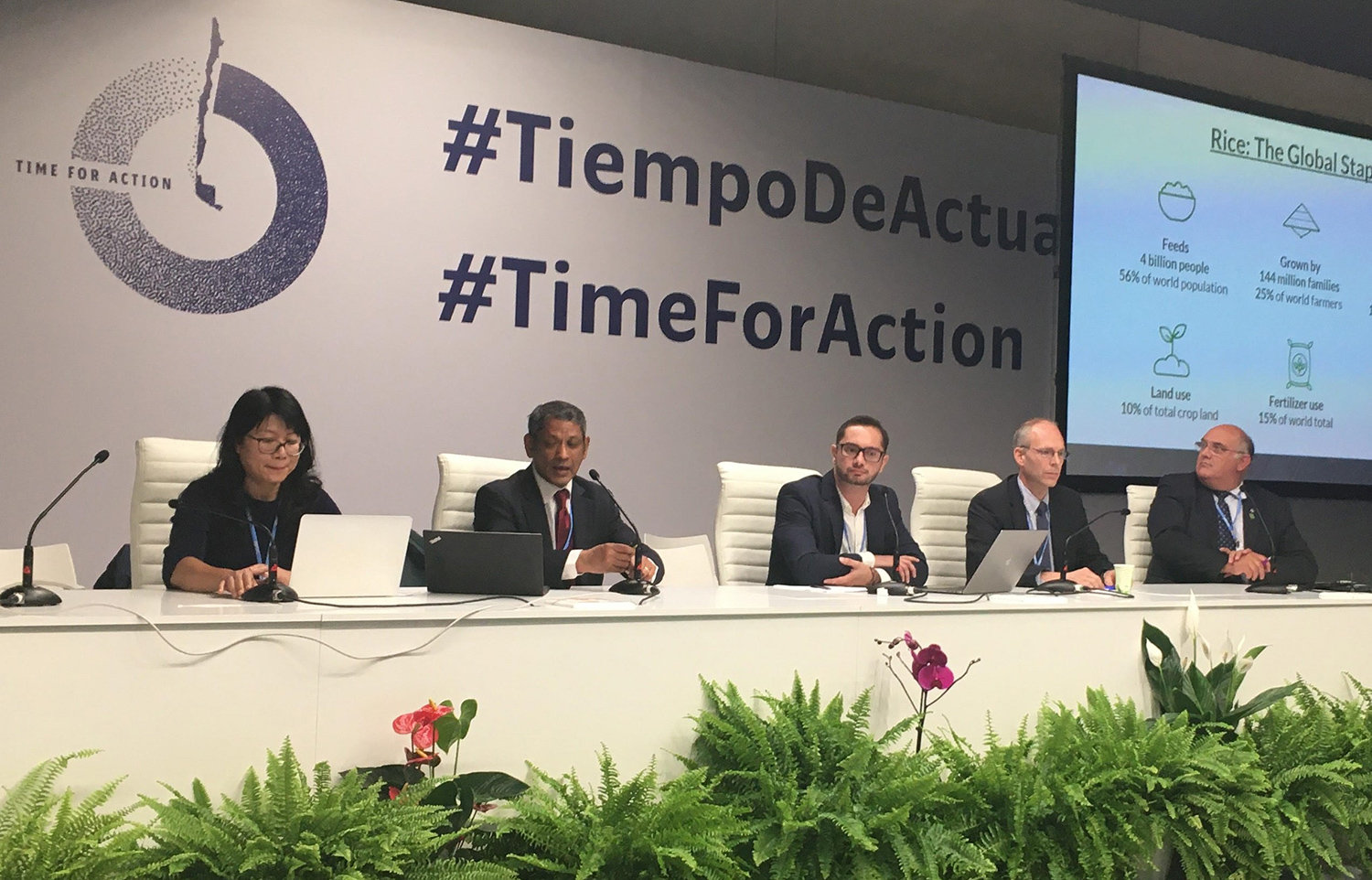IRRI, IFA spark discussion on sustainable agriculture at COP25

In the photo are (from L to R): Ms. Le Hoang Anh, Department of Science Technology and Environment (DoSTE) and Ministry of Agriculture and Rural Development (MARD) Senior Officer and Ag NDC Focal Point; Dr. Nafees Meah, IRRI Regional Representative for South Asia; Mr. Martijn Pakker, IRRI Senior Manager for Advocacy, Engagement, and Communication; Dr. Markus Schmid, BASF Head of Business Management, Nitrogen Management; and Dr. Theo de Jager, World Farmers’ Organization Chairman
4 December 2019, Madrid, Spain - The International Rice Research Institute (IRRI), together with the International Fertilizer Association (IFA), organized Earth, Air, Fire, & Water: Elements for Sustainability at the United Nations Climate Change Conference, held last December 3, 2019 in Madrid, Spain. The session presented interventions categorized into the 4 “elements” that could contribute to both climate change adaptation and mitigation, from enhancing nutrients in the soil to developing varieties of crops that emit less greenhouse gases (GHG).
The panel was comprised of Dr. Nafees Meah, IRRI Regional Representative for South Asia; Dr. Markus Schmid, IFA Member and BASF Head of Business Management - Nitrogen Management; Dr. Theo de Jager, World Farmers’ Organization Chairman; and was moderated by Mr. Martijn Pakker, IRRI Senior Manager for Advocacy, Engagement, and Communication.
In her keynote speech, Ms. Le Hoang Anh, member of the Vietnamese Government delegation to COP25, highlighted how national policies could apply interventions in agriculture to mitigate and adapt to the impacts of climate change.
Climate change is already evident in various phenomena such as historic flooding, unprecedented droughts, and sea level rise. This can have a long term impact on human health, agriculture and food security, water resources, and the environment. In the context of agriculture, every 1°C temperature increase will result in a 1.3% loss in economic growth and a 10% yield reduction in crops.
With the global staple rice as an example, IRRI has defined a coherent research portfolio on climate change emphasizing on three areas: adaptation, mitigation, and policy. This set rice production into the broader context of food supply and food security alongside socio-economic issues, such as rural development and gender mainstreaming.
Rice is the staple food for more than half of humanity and the primary staple for more than two-thirds of the world’s poor. By 2040, an extra 112 million tons of milled rice per year will be needed worldwide. Transforming rice-based agri-food systems is of prime importance.
‘Financing sustainable rice for a secure future’ video produced by the Earth Security Group identifies opportunities to adapt sustainable finance innovation to accelerate the rice sector’s sustainable transition. As shown in the session, it proposes three innovative finance solutions to support sustainable rice production in line with countries’ Paris Agreement climate targets which include issuing ‘rice bonds’ and leveraging global climate finance as practical pathways to attract private sector investment for climate-smart rice production.
Other initiatives of IRRI include the development of climate-smart rice varieties that can tolerate adverse climate conditions, such as drought, flood, salinity, extreme temperatures, and poor soils. There are also water-saving and resource-efficient technologies and crop management systems that help reduce resource-use and input, such as micro-irrigation, direct seeding, and ICT tools like AutoMon.
“Alternate Wetting and Drying technology, which was developed by IRRI and its partners, addresses the twin problems of adaptation and mitigation through efficient water management,” said Dr. Meah. “It enables farmers to save on irrigation water by up to 30% and reduces methane emissions by 30‒70% without yield loss.”
@CropLifeIntl quoted Dr. Jager in a tweet, “When you ask farmers what climate change is all about, the first answer would probably be about disaster. You don’t have to convince farmers that climate change exists, no one is as vulnerable to it as they are!” Also in a live tweet by @worldfarmersorg, Dr. de Jager said, “No other economic actor can do more in a short window of time to mitigate and adapt to climate change than the farmers.”
Dr. Schmid represented the global fertilizer industry by explaining the value of the 4Rs - applying the Right nutrient source at the Right rate, at the Right time, and in the Right place - and combining these with innovative technologies such as nitrification inhibitors to reduce Nitrous Oxide (N2O) emissions while maintaining high yields.
“Collaborations among research institutions, the private sector, governments, and national research and extension systems play a vital role in ensuring that climate-responsive innovations and technologies reach those who need them the most,” Mr. Pakker said.